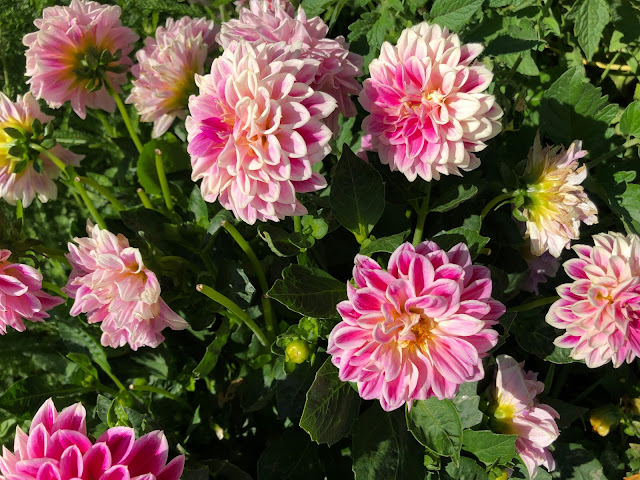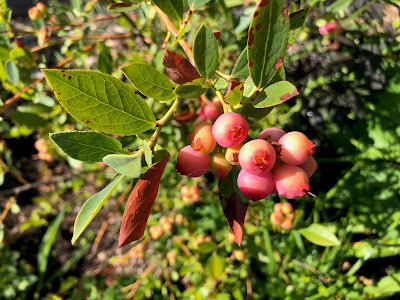
|
|
These dahlias are a small part of an intensely planted community garden plot. (Photos: Kathy Morrison)
|
Oh, yeah, then there's weeding ... and bugs
At the community garden where I've worked a plot for 15 years, the gardener two plots down from mine has a beautiful and intensely planted flower and vegetable garden. The gardener -- I'll call her Elena to protect her privacy -- has managed to fit grapes, blueberries, tomatoes, cane berries, dahlias, coneflowers, yarrow and dozens of other things into a 20-by-20-foot piece of ground, all the while keeping the weeds at bay. A retiree, she's there most mornings, tending something.
And when visitors to the garden round the corner and see Elena's plot, they stop and gawk. I don't blame them. But they don't see how hard she's worked to get it that way.
Those of us with plots often are asked by these same visitors how they can join the garden.
"There's a waiting list," we answer. "Call the parks district office and ask to be put on it."

|
|
The "Pink Lemonade" blueberries in Elena's plot always
evoke exclamations of "wow" from passers-by.
|
They might or might not join the list. If they do, I wish they'd spend their waiting time learning how to garden. Too often the newbies walk in and expect to have an Elena-like garden immediately. They easily become discouraged, and their plots suffer -- making it harder for the next new gardener who takes that spot.
-- You don't have to become intimately acquainted with dirt. Dirt's the stuff on your shoes, in your hair, on your shirt and under your fingernails. Soil is what the plants grow in.
-- You also don't have to worry about sweating through your gardening clothes. A couple times a day.
-- You can sleep in on days that are predicted to have temperatures in the 100s. You don't have to jump out of bed as soon as it's light to wet down everything before the scorcher hits.
-- You can keep a manicure gorgeous for weeks; no weeds to pull!
-- You avoid the heartbreak of your lovingly tended seedlings succumbing to slugs.
-- You never have to worry that there aren't enough bees in the garden.
-- No fretting about the squirrels getting to that first ripe peach or tomato before you do.
-- You don't have to expend energy fighting spider mites and stink bugs.
-- You avoid conversations that start "Which tomatoes are you growing this year?"
-- Also, no fear of boring relatives with explanations of citrus rootstock. (Sorry about that, Kevin.)
-- You needn't worry that you're having meaningful, though one-sided, conversations with the worms in your compost pile.
-- You don't have to find homes for all the excess zucchini.
-- Phrases such as "organic mulch," "damping-off," "nitrogen deficiency" and "fusarium wilt" never become part of your vocabulary.
-- You don't wake up in the middle of the night wondering whether you should have planted something else.
See, life is so much easier if you don't start down that gardening path. But if you want to become an Elena, she shared the secret: "You have to put in the time."


